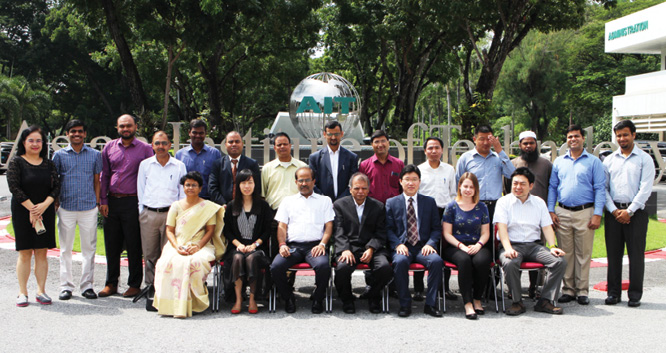RIMES, the Regional Integrated Multi-Hazard Early Warning System for Asia and Africa, and ECMWF have had a cooperation agreement for the exchange of information and expertise since 2012, and recent discussions have led to further collaboration on flood forecasting. The purpose of RIMES is to provide early warning services for enhanced preparedness, response, and mitigation of natural hazards, according to the different needs of its Member States. One aspect of this is flood forecasting, in particular for flood events that occur across country borders. Cross-border rivers in Asia include the Ganges, Brahmaputra, Meghna, Indus and Mekong rivers, and there is an urgent need to build capabilities for the forecasting of transboundary flood events.
GloFAS, the Global Flood Awareness System, has the potential for use in forecasting such events since it combines ECMWF’s medium-range weather predictions with a hydrological model to provide probabilistic flood forecasts for the global river network.

A regional training event for flood forecasting in transboundary river basins, organised by RIMES and UN-ESCAP (United Nations Economic and Social Commission for Asia and the Pacific), was held at the Asian Institute of Technology, Thailand, from 3 to 7 October 2016. It was attended by meteorologists and hydrologists from six countries in the region alongside representatives from several other international organisations. At this workshop, RIMES highlighted the work they are doing with GloFAS, and delegates presented aspects of flood forecasting in each country. Nepal-based hydrologist Mr Binod Parajuli demonstrated how GloFAS had been used successfully alongside existing forecasting capabilities to forecast a severe flood event in Nepal this monsoon season.
ECMWF’s role in the training workshop was to provide an interactive training session on using GloFAS forecasts, and to discuss collaboration on flood forecasting with RIMES Director Mr A.R. Subbiah. Moving forward, ECMWF and RIMES will work together to continue improving GloFAS forecasts and work towards integrating GloFAS into the existing national and regional forecasting capabilities in countries across the region. RIMES has recently been evaluating GloFAS forecast skill in two river basins in Nepal and Myanmar. Preliminary results are promising and, going forward, RIMES will expand the evaluation to cover river basins in each country they are working with – potentially up to about 50 countries across Asia and eastern Africa. ECMWF will provide RIMES with past GloFAS forecasts for evaluation and, on the basis of the evaluation results, real-time forecast data. RIMES is also looking to work closely with its Member States in order to provide ECMWF with observed river data from countries across the region. ECMWF will use this data to calibrate GloFAS and thus further improve the forecasts.
Both ECMWF and RIMES are excited to continue collaborating to further improve forecast and early warning capabilities for transboundary flood events across the region.

